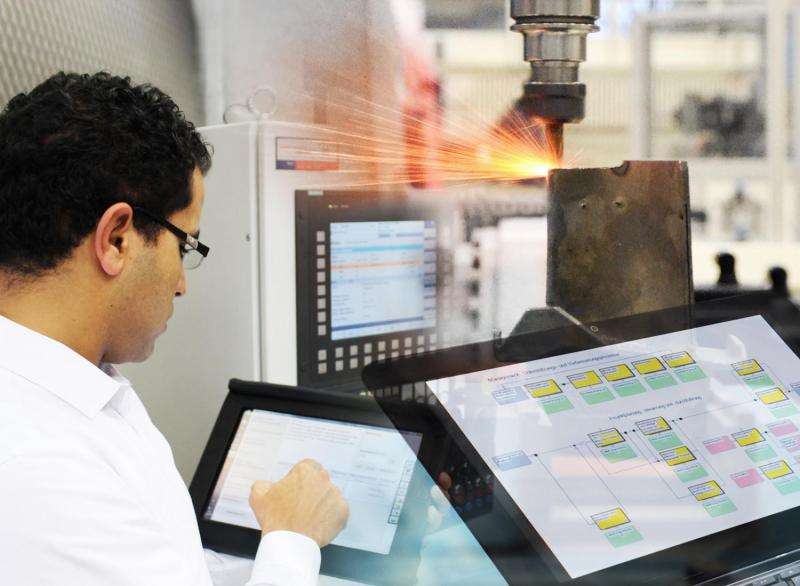All production processes are displayed on the monitor. Credit: © Photo: Fraunhofer IPK
Everyone's talking about "Industrie 4.0", but opinions differ on how to set up highly flexible production that works as quickly – and as cheaply – as line production does. Fraunhofer researchers have found a solution: they organize production to operate without rigid plans and fixed chains, turning human coordination and decision-making skills into a key component of sequence control. Exactly how that works is what the researchers will be presenting at the Hannover Messe 2016 – the preview on January 27, 2016 provides the first glimpse of their achievement.
Underlying the term Industrie 4.0 is the idea that in the factory of the future, machines will communicate directly with each other, with workpieces and with human workers. The ultimate goal is for production to organize itself. Experts hope that Industrie 4.0 will provide a more flexible production setup and the ability to respond to customer wishes more quickly.
It is precisely this goal that the Fraunhofer Institute for Production Systems and Design Technology IPK aims to achieve by putting people at the center. Human workers wield the power to make decisions about the production sequence, and receive help in making those decisions from high-performance tools. The Fraunhofer research scientists use gear manufacturing as an example to illustrate what this means. Presently, gears are manufactured in firmly linked lines that connect, say, milling machines and turning machines to each other in a chain. If one machine goes offline, the entire line shuts down. Another drawback with line production is that it is expensive and time-consuming, if not actually impossible, to execute small and very small orders that have special requirements or product features. "If you want production to be more flexible, it is a promising idea to break up the chains," says Eckhard Hohwieler, head of IPK's Production Machines and Systems Management department. "But that's harder than it sounds."
Grouping machines into cells
One alternative to the line concept is workshop production. In this configuration, machines that carry out similar tasks are grouped together in cells – for example, several turning machines are clustered in a turning-machine cell or several milling machines become a milling-machine cell. However, as Hohwieler points out, "if you do that, you need methods that guarantee products will progress swiftly and reliably through the entire production process. Otherwise a work step may be left out or an order might get stuck halfway through production because no one knows where to send it next." Here's where IPK research comes in.
At Hannover Messe 2016, the Berlin-based research team will present an integrated Industrie 4.0 factory that replaces fixed links with a new kind of process organization without sacrificing the reliability of line production. In this factory, IT driven tools ensure that employees at all hierarchy levels receive the information they need at any time in order to play their part in the punctual manufacturing of the product – whether it be in process management, production planning, or final assembly.
Agent system to monitor the production plan
One aspect of the factory will be on display at the Hannover Messe Preview on January 27. The iWePro project, which focuses on intelligent cooperation and networking for workshop production, brings together IPK engineers and industry partners to explore how gear manufacturing can be reliably managed on the shop floor without linking machines into chains. "Until now, the entire production process – all the way from the blank to a ready-to-use gear – was planned out in advance and then simply carried out," explains Franz Otto, a research fellow at IPK. To make it possible to manage workshop orders as the situation demands, he and his colleagues are currently developing an agent system that monitors implementation of the production plan. The agents – components of the agent system software – supply employees at the various workshop stations with information such as which machine is slated for the next processing step. They can also provide assistance when ad hoc rescheduling is required, for example if a machine stops working.
"But before production cells can become a reality, we have to investigate whether they are in fact an alternative to conventional line production, which is already quite sophisticated," says Otto. To that end, iWePro generates an elaborate simulation that the researchers can run to determine which combination of centralized planning and flexible adaptation is suitable for which use case – which interventions by workers make sense. The simulation also addresses how to provide the necessary detailed information to workers on the shop floor; for example, by means of smart devices.
Flexible co-existence of humans and machines
The simulation of workshop production, to be shown during the Preview and later at Hannover Messe (Hall 17, Booth C18), creates a 3D image of all processes in produc-tion. "This echoes the view from a control station," explains Hohwieler. At Hannover Messe, the researchers will combine the simulation with a model-driven industry cockpit and a two-armed assembly robot. The cockpit enables managers to flexibly
Provided by Fraunhofer-Gesellschaft























